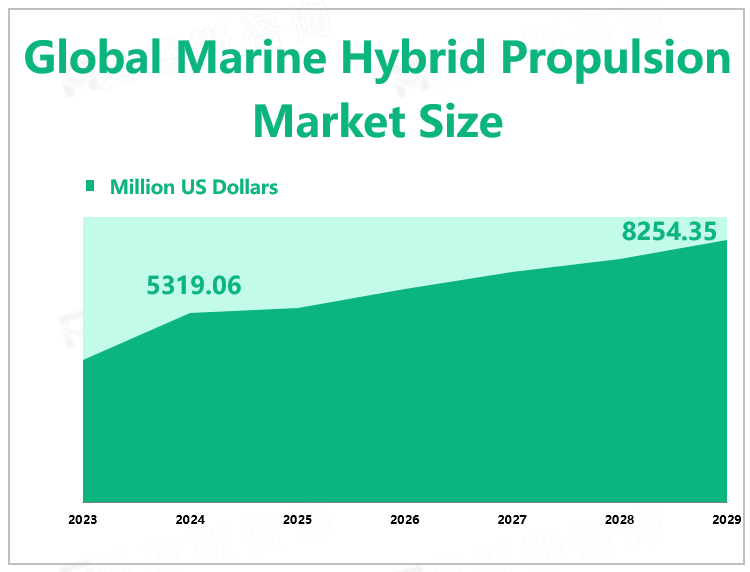Global Marine Hybrid Propulsion Market Overview
According to Global Market Monitor, the global marine hybrid propulsion market size is $5319.06 million in 2024 and is expected to grow to $8254.35 million by 2029. The marine hybrid propulsion system combines an internal combustion engine with battery power and can be used on all types of ships to save maintenance and engine life while improving power and performance.
Development of Maritime Trade
The shipping industry is the lifeblood of the global economy, is synonymous with global economic growth, and plays an important role in international trade. Shipping accounts for more than 80% of international trade transportation. The advantages of ocean transportation are its large volume, low shipping costs, and the availability of shipping routes. As international trade becomes more frequent, maritime trade will continue to expand, bringing benefits to consumers around the world through competitive freight rates. With the rise of international maritime trade, the market for marine hybrid propulsion systems will further expand.
Compared with traditional ships, the design and construction of hybrid ships are more complicated, and it has higher requirements for initial investment and maintenance. Therefore, not all types of ships are suitable for hybrid propulsion systems. Compared with the traditional diesel system, due to its high development and implementation costs, it limits the development of marine hybrid power systems. It requires alternative energy sources to store energy, such as costly battery storage systems.
Conducive to Environmental Protection
According to a report by the International Council on Clean Transportation, hybrid propulsion systems installed on container ships can reduce fuel consumption by 10-20%. Another study reported that hybrid propulsion systems can save up to 30 percent of fuel compared to conventional propulsion systems, and hybrid propulsion systems are significant in reducing fuel consumption and reducing operating costs. According to the Journal of Marine Science and Engineering, hybrid propulsion studies have shown that compared to conventional propulsion systems, hybrid propulsion reduces carbon emissions by 66 percent while increasing life cycle costs by 40 percent.

Growing Demand for Coal, Crude Oil, Steel, and Other Resources in Emerging Countries.
The emerging market economy is recovering strongly. The energy and resource needs of developing countries are the main driving force for world energy and resource growth. With the development of the economy and industry, the demand for coal, crude oil, steel, and other resources in emerging countries is growing. The trade imbalance between developed and developing countries has been decreasing in recent years, and developing countries have made significant contributions to global maritime trade. They account for almost two-thirds of global cargo handling. The growing demand for resources in emerging markets is driving the expansion of the shipping market.
China is the leading manufacturer of Marine equipment, producing 90% of the world's shipping containers and 80% of the world's ship-to-shore cranes. In terms of the competitive landscape, China Shipbuilding Industry Co., LTD., COSCO Shipyard Group Co., LTD., and Dalian Shipbuilding Industry Co., Ltd. are the major OEMs with Marine hybrid propulsion market share in China, as they have strong R&D investments and focus on increasing technology development.
|
Company Name |
BAE Systems |
|
Website |
www.baesystems.com |
|
Established Time |
1999 |
|
Plants Distribution |
Europe |
|
Sales Region |
Worldwide |
We provide more professional and intelligent market reports to complement your business decisions.